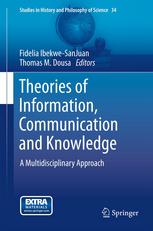

Most ebook files are in PDF format, so you can easily read them using various software such as Foxit Reader or directly on the Google Chrome browser.
Some ebook files are released by publishers in other formats such as .awz, .mobi, .epub, .fb2, etc. You may need to install specific software to read these formats on mobile/PC, such as Calibre.
Please read the tutorial at this link: https://ebookbell.com/faq
We offer FREE conversion to the popular formats you request; however, this may take some time. Therefore, right after payment, please email us, and we will try to provide the service as quickly as possible.
For some exceptional file formats or broken links (if any), please refrain from opening any disputes. Instead, email us first, and we will try to assist within a maximum of 6 hours.
EbookBell Team

4.8
94 reviewsThis book addresses some of the key questions that scientists have been asking themselves for centuries: what is knowledge? What is information? How do we know that we know something? How do we construct meaning from the perceptions of things? Although no consensus exists on a common definition of the concepts of information and communication, few can reject the hypothesis that information – whether perceived as « object » or as « process » - is a pre-condition for knowledge. Epistemology is the study of how we know things (anglophone meaning) or the study of how scientific knowledge is arrived at and validated (francophone conception). To adopt an epistemological stance is to commit oneself to render an account of what constitutes knowledge or in procedural terms, to render an account of when one can claim to know something. An epistemological theory imposes constraints on the interpretation of human cognitive interaction with the world. It goes without saying that different epistemological theories will have more or less restrictive criteria to distinguish what constitutes knowledge from what is not. If information is a pre-condition for knowledge acquisition, giving an account of how knowledge is acquired should impact our comprehension of information and communication as concepts.
While a lot has been written on the definition of these concepts, less research has attempted to establish explicit links between differing theoretical conceptions of these concepts and the underlying epistemological stances. This is what this volume attempts to do. It offers a multidisciplinary exploration of information and communication as perceived in different disciplines and how those perceptions affect theories of knowledge.